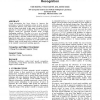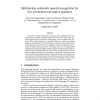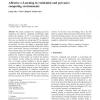245 search results - page 21 / 49 » Emotion Recognition from Speech: Stress Experiment |
ICMI
2004
Springer
14 years 28 days ago
2004
Springer
Visual information has been shown to improve the performance of speech recognition systems in noisy acoustic environments. However, most audio-visual speech recognizers rely on a ...
EJASMP
2010
13 years 2 months ago
2010
Computer Assisted Language Learning (CALL) applications for improving the oral skills of low-proficient learners have to cope with nonnative speech that is particularly challengin...
ISF
2008
13 years 7 months ago
2008
This article examines how emerging pervasive computing and affective computing technologies might enhance the adoption of ICT in e-Learning which takes place in the home and wider ...
FGR
2011
IEEE
12 years 11 months ago
2011
IEEE
— Despite major advances within the affective computing research field, modelling, analysing, interpreting and responding to naturalistic human affective behaviour still remains...
ICASSP
2009
IEEE
14 years 2 months ago
2009
IEEE
We present a data-driven framework for expanding the lexicon to improve Mandarin broadcast news and conversation speech recognition. The lexicon expansion includes the generation ...



